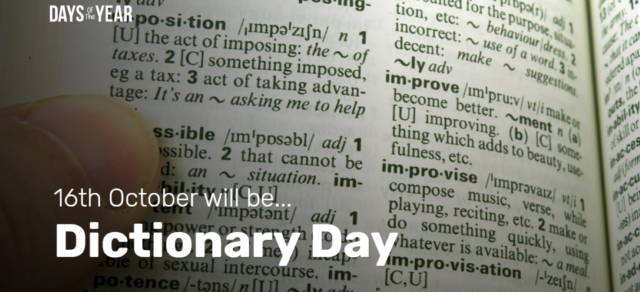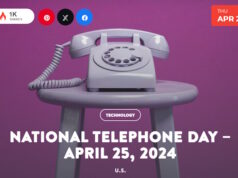
There is power in language, in the command of a broad vocabulary consisting of many words. Poets use words to describe a great and beautiful world, to enchant us and enlighten us. Scientists fiddle out the minutest of miracles in the functioning of the world, and pass them on by using precise and clear language that transmits information from one to another. So it is only fitting that such a thing as Dictionary Day would exist to encourage us to challenge our vocabulary, to broaden it and perhaps take an opportunity to expand our language to the full scope of the tongue’s diversity.
- The first English dictionary, A Table Alphabeticall, published in 1604, described itself as being ‘for the benefit of Ladies … or other unskilfull persons’
- You might be surprised to learn what the most “complicated” word in English is—that is, the word with the largest number of separate definitions. And, well, there actually are a couple of answers. The current winner is technically “set,” and it’s held the title since 1989. In that edition of the Oxford English Dictionary, the word had…wait for it…430 separate definitions. This amounted to a total of 60,000 words to explain one!
- In the next (print) edition of the OED, due out in 2037, there will be a new champion. According to the editors, the word “run” has now amassed 645 separate meanings…for the verb form alone!
- The longest English word that generally appears in dictionaries is “pneumonoultramicroscopicsilicovolcanoconiosis,” the name of a lung disease. It has forty-five letters. According to Lexico, this word was actually created to poke fun at long, overly technical medical terms.
- Another, much longer word is actually considered the longest in English—and it’s another scientific term. It’s the name for a program nicknamed “titin,” and it has a whopping 189,819 letters! It would take a full 12 pages to write them all out, so, understandably, dictionaries choose to omit it.
- Dictionary editors are only human, so they do make mistakes! Perhaps the most famous dictionary error of all time is “dord,” the imposter word. While editors were compiling words for the 1934 Webster’s New International Dictionary, a card for an abbreviation accidentally ended up in the pile of word cards. (The plan had been to keep abbreviations and words separate.) The abbreviation was “D or d,” a capital or lowercase D short for “density.” But since it ended up in the word pile, it was printed in the dictionary as “Dord,” meaning “density.” But no harm done; no one noticed the error for five years!
- When the first edition of the Oxford English Dictionary debuted, in 1888, it was missing the word “bondmaid.” An old-fashioned (even then) term for an enslaved girl, “bondmaid” had been in common use in the 16th century and was derived from a Biblical translation. You might find it remarkable that it took until the 1933 edition for the word “bondmaid” to finally appear, until you learn that it actually took 50 years for the second edition to come out.
- Of all the words that have been mixed up with other words and had their meanings diluted over time, dictionary.com has declared one the most abused of all. Any guesses? It’s “ironic.” Their argument is that the word is almost never used correctly—you’ll most often hear it used to mean something that’s funny, coincidental, or unexpected. And while it can describe something that is any of those adjectives, it has to be funny, unexpected, etc. because it’s the exact opposite of what you’d expect. So it’s a much more nuanced word than its popularity would suggest—yet there are still plenty of funny true examples of irony that give you a good idea of what it really means.
- Why would dictionary editors sometimes deliberately include errors? To trap copyright infringers. And it’s not just dictionaries that use this tricky technique. In addition to dictionaries, other resource publications like encyclopedias and maps throw in a fake word (or fact, or place), very much on purpose. If a dictionary (or encyclopedia, or map) from another company, produced later, contains that fake, planted trap, bingo! The “trickers” know that the “trick-ees” were stealing their work, rather than compiling and researching words themselves. In the most famous instance of this, the New Oxford American Dictionary slipped the non-real word “esquivalience” into their 2005 edition. Lo and behold, “esquivalience” appeared, with its fake definition, on dictionary.com.
- Noah Webster learned 26 languages to write his dictionary. He learned 26 languages, including Sanskrit and Old English, to write his dictionary. Published in 1828, it contained 70,000 entries and included the first definitions of “American” words such as chowder and skunk.
- Due to human error, a handful of fake words have appeared in dictionaries over the centuries. Some words, like phantomnation, which appeared in an 1864 edition of Webster’s, are the result of missing hyphens. Others are typographical errors. A 1934 edition of Webster’s New International Dictionary defined dord as density, the result of confusion over spacing. Some dictionary editors have even intentionally included fake words, such as esquivalience in The New Oxford American Dictionary, to protect their copyright.
- If laid end to end, the typescript for the first edition of the Oxford English Dictionary would have stretched from London to Manchester.
- The word ‘esquivalience’, which appears in the New Oxford American Dictionary, was invented by one of the editors to catch out plagiarists.
Sources:












